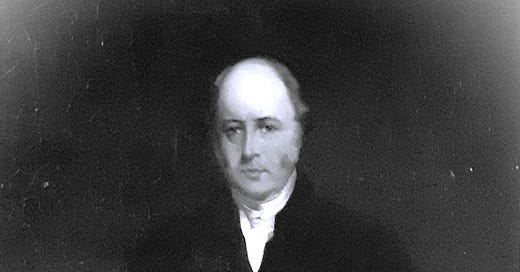Who was George Harris?
Apologies for the lack of Unitarian Roots this month. April just didn’t seem to allow enough time to prepare our next talk. Our last talk was on Joseph Priestley (1733-1804) and our next one will be on American Unitarianism, and in particular William Ellery Channing (1780-1842). But between now and then, I’d like to tell you about a very fine Unitarian called George Harris (1794-1859).
He’s not as famous as the other figures we’ve been learning about but he’s still a very major figure in the history of British Unitarianism. One of the many interesting and significant things about him is that he was among the first generation of Unitarian ministers to be born Unitarians. Theophilus Lindsey and Joseph Priestley left their respective denominations behind to embrace Unitarianism but George Harris was the son of a Unitarian minister, and, from his childhood embraced Unitarianism as the true way with a fervour that never left him.
Thanks to his father’s connections he had the great fortune to get to know Thomas Belsham while still a child. Belsham was the successor to Theophilus Lindsey at the first officially Unitarian chapel in England, and the man who developed Unitarianism into a national denomination. (He’s another great man that we don’t have time to stop by in Unitarian Roots).
I shall be briefly mentioning some of George Harris’s thoughts and writings during services and will also write more detailed stuff about him in my personal blog, Christian Unitarian Ark.
For now, here’s a few more tidbits. George was passionate about his Unitarian beliefs and he stuck to them through thick and thin. He was a strong opponent of slavery and a champion of the poor. But although he was a highly intelligent man he wasn’t really an academic or an intellectual. He wrote his sermons in a style that’s not too hard for modern people to follow because he thought communicating the truths of Unitarianism was more important than getting bogged down in minutia.
It’s often been a criticism of Unitarianism that it gets too abstract and academic, and that it can be susceptible to intellectual fads. Harris would have endorsed such criticisms. He wasn’t interested in minor debating points of theology or speculating about things that we’ll never get an answer to. He saw such pursuits as ways of failing to see the woods for the trees. Perhaps that’s a lesson that he drummed into our former minister Henry Green, or his great friend, William Gaskell - both of whom were students of Harris when training for the ministry.
There’s much for us to admire and learn from George Harris today. Although he was in the mainstream of the Unitarian tradition that he inherited he did make some very valuable contributions to its thought as well. I look forward to telling you about some of these in the near future.




